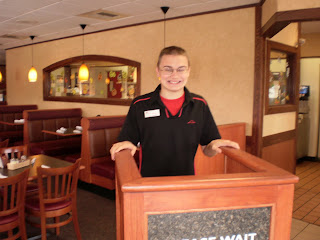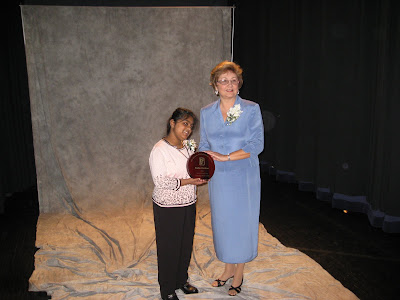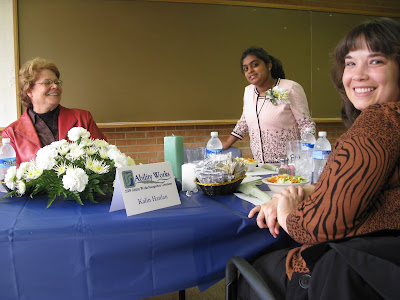We are hoping to create a platform to discuss opportunities, ideas, and needs regarding work in West Virginia
Monday, November 30, 2009
Roadblocks in the Journey for Success
Wednesday, November 25, 2009
Linking Discovery & Job Development by GHA

Griffin-Hammis Associates is offering an upcoming training called "Linking Discovery and Job Development." Click here to read the announcement in a clearer format.
The training will be a unique, experiential job development certification training--Dave Hammis and Cary Griffin will provide the training.
Tuesday, November 24, 2009
On Thankfulness
Disability Is Illuminating
Father's blindness makes whole family stronger
BY INGA DIETLINSpecial to the Record-Eagle
'But I will never see her face."
This comment was made in 1991, nine months before my birth.
While the births of my siblings had been joyous occasions, mine was mixed with sorrow. My father has a degenerative eye disease called Retinisa Pigmentosa, or R.P., which was diagnosed at a very young age. This disease slowly stole his eyesight, making him almost completely blind at the time of my arrival. Although his blindness has been a trial in many ways, it has also blessed both him and our entire family with the joy of having guide dogs, viewing other disabled people in a more compassionate manner, and in spiritual growth. When I was 5, Dad received his first guide dog, Mischa. The 1-year-old German Shepherd only had basic training. But with the help of a local dog trainer, he quickly learned how to safely lead my dad around obstacles.
Before we moved to Michigan and had Mischa, my family lived in Chicago, where Dad worked as a piano tuner. Since he maintained a large clientele there, he continued to travel back and forth every other week, while my mom stayed with my siblings and me in Michigan. Mischa aided Dad in traveling on airplanes and navigating through city streets. After Mischa had been working for almost seven years, my dad realized he would need a replacement dog. We soon received an 8-week-old puppy and named him Bartok. Bartok watched Mischa work for two years, which contributed greatly to his excellence in leading. Bartok began to guide Dad when Mischa was about 9 years old. Almost two years later, after Mischa had been sick for many days, I received the news that he had been put down. This was one of the most emotional moments my family and I had ever experienced, and it was very heart-wrenching for Dad to say good-bye. No dog can replace Mischa in our memories, but Bartok is a great helper, keeping Dad safe both in Michigan and Chicago. Although it may seem like my father's trips to Chicago are perfect, he still encounters many rude people unwilling to even help him navigate a busy street, or move from their seat on a crowded bus. It is obvious that my dad has a disability and may need assistance, but most people seem too busy to realize he exists. Through viewing his attempts at obtaining a seat on crowded Chicago Transit Authority buses, the whole family has become aware of people with disabilities, and we strive to help those who may be in need. Many who see another person with a disability such as blindness simply gawk as though the person is contagious. Dad has aided me in realizing that even though the person is disabled, they are just like me. Because of this, I am often one of the few to leave my seat on a bus in favor of letting a disabled person take the chair. The obstacles that Dad encounters through his blindness, whether it is simply steering himself through a throng of people or being denied a seat on the bus, have all been formidable. But he is able to overcome them through his sturdy believe in Jesus Christ. The sorrow that my dad expressed when told I was going to be born was short-lived, but powerful. Although he was thrilled at the idea of having another child, the notion that he would miss seeing me grow into a woman left him somber. His eyesight has slowly degenerated throughout most of his life, but by becoming a Christian at a young age, his faith helped him cope with the impending blindness. After becoming completely blind, it seemed that studying the Bible would be impossible, until he received the treasured gift of a Bible on CD. This has allowed him to continue reading as well as memorizing. Because of this passion for memorizing the Bible, he has inspired my siblings and me to attempt the same feat. His attitude is also a product of his faith. While many people who have disabilities are bitter because of their misfortune, my dad is well-liked by everyone because of his inner joy. Dad's hardships have threatened to dismantle his faith and good attitude, but he is always able to return to his faith and discover the promises held in the Bible.
Disabilities can tear families apart, but my dad's blindness has made our stronger. We connect over the faith that we share, and enjoy the dogs that have made his mobility possible. Throughout my days, I am constantly aware of the impact his blindness has made on my life, whether it be increased awareness of other people or thankfulness for my many blessings. I know that my dad has never had the chance to see me growing up, but I recognize that he has helped me become the woman I am today.
Inga Dietlin is a sophomore at Elk Rapids High School
Welcome to Pizza Hut my name is Michael

This is a picture of Michael Wilson. Michael is a 2009 graduate of Tygart's Valley High School of Mill Creek, WV. He is a very ambitious young man who has autism. Michael enjoys playing video games, reading, watching movies, and comic books.
Michael has no prior work experience but he had a desire to work at his favorite restaurant, Pizza Hut--he wanted to greet and seat the customers. We used his own networking system of "social capital" as a tool for "customized employment". Michael began working on September 16, 2009 with a job coach, Andrea.
Leslie the restaurant manager, his co-workers, and the customers all appreciate his hard work, dedication, and wonderful smile! He gets very excited when he is given tips or what he calls "bonuses".
Michael has also expressed an interest in possibly owning a business that specializes in video games, movies, and comic books; hopefully, Job Squad will assist him with writing a PASS(Plan to Achieve Self-Support) through the Social Security Administration.
Michael is very fortunate to have a supportive family. His mother Sally has always encouraged him to purse his dreams and to excel in life. Sally is very proud of Michael, and has been a strong advocate for his rights. In the beginning stages of his employment she was scared to death of his social differences, but has seen that they can be worked through. She says that some days are harder than others, his capabilities to cope with his environment varies, but Michael is very lucky to have such wonderful working relationship with his job coach Andrea.
Sally also says that Tygart's Valley High Schools was instrumental in preparing him for the work world. She recognized how wonderful the staff and teachers were in accepting Michael.
Wednesday, November 18, 2009
Amanda is a happy girl! She just got her very first job.
But this isn’t the end of the employment road for her. Actually, it might only be the beginning, thanks to a Plan to Achieve Self-Support.
http://wvworkforce.org/youth_prog/default.asp
Four years later, Amanda was still looking for a job. Seeing an article in the local Glenville, WV newspaper about Job Squad’s employment services prompted Amanda to make a call. She said: “I really need help getting a job.” We discussed her employment goals, as well as Social Security work incentives. She recently had received a packet from SSA with Ticket to Work program information, but didn’t know how to go about using it. With no internet connection, and limited computer skills, she wasn’t able to get more information online about the program or area Employment Network members.It turned out to be the ‘right time and right place’ for a cleaning job with the WV DOT’s Division of Highways, in the Gilmer County office. Thanks to the WV-ARF state use program, we were able to assist her in getting just the kind of work she wanted. Within two weeks she had her dream job. Fortunately, it was only eight miles from her rural community of Cox’s Mills. Amanda is unable to drive to and from work. But transportation could be provided by her mother, with whom she lives.
It also deserves mentioning that, if it weren’t for a grant provided by the West Virginia Division of Rehabilitation Services to expand Job Squad’s employment services to Gilmer County, Amanda would still be sitting at home dreaming about a job.
We called her after a week to see how things were going. “I like my new job a lot,” she said, “but I am interested in a PASS (Plan to Achieve Self-Support).“ How did Amanda know about Social Security’s PASS plan? At our first meeting with her and her mother we discussed the SSA PASS, which is another work incentive that she qualifies for.
“A Plan for Achieving Self Support, or PASS for short, is a plan for your future. Many people with disabilities want to work, and you may be one of them. Perhaps you need to go back to school before you can get a job. Or, maybe you'd like to start your own business, but you don't have the money. Whatever your work goal may be, a PASS can help you reach it.”
http://www.ilr.cornell.edu/edi/pass/
According to The Center For An Accessible Society:
“A 1998 national report indicated that sheltered workshop clients earned an average of $65 per week, while rehabilitation clients working in the competitive labor market earned an average $272. Even for people with severe mental retardation, earnings are significantly higher in competitive employment. Workshop clients earned a weekly average of $37, and workers in competitive employment made $110. Supporters often defend sheltered workshops as a "transitional step" to prepare people to enter the competitive work force. Studies have consistently shown that segregated environments do not prepare people to live, work, or participate in integrated environments. A mere 3.5% of people in sheltered workshops move into competitive employment in a given year. This is one reason why the federal Rehabilitation Services Administration ruled in January 2001 that sheltered workshop placement would no longer qualify as an accepted employment outcome.”
http://www.accessiblesociety.org/topics/economics-employment/shelteredwksps.html
The program was created by the legislature in 1984 and strengthened in 1989. The program allows the employment of persons with disabilities through nonprofit Community Rehabilitation Programs (CRP) to produce commodities and services for various state agencies without the requirement of competitive bidding.
Prices charged for these special commodities and services are established by the Governor-appointed Committee for the Purchase of Commodities and Services from the Handicapped.
All West Virginians benefit when our citizens with disabilities are able to work for a wage. Their need to consume costly social services is drastically reduced when rehabilitation is mixed with business.
In 2005, the program enabled:
· Approximately 891 persons with disabilities to earn a wage
· Person with disabilities to work 765,275 hours
http://www.wvarf.org/stateuse/
While State and Federal noncompetitive employment programs for persons with disabilities are a very useful stepping stone, they may not be a desirable destination.
So for Amanda to use a PASS, she needs to have a job. Having an active PASS plan will help her save for future employment opportunities beyond doing janitorial work. And for every two dollars earned, Amanda won’t lose a dollar of her SSI payments. She can put her paycheck in the bank and save for a better career, while keeping all of her SSI check.
When she is ready, she can start her own business, or use her PASS funds to take advantage of Customized Employment services.
What is Customized Employment? According to the U.S. Department of Labor:
Customized Employment - Practical Solutions for Employment Success
"As we invest in critical job training, we are giving workers the bargaining power they need to custom-design their jobs around their lives—instead of the other way around."
—Secretary of Labor Elaine L. Chao
The Office of Disability Employment Policy (ODEP), an agency of the U.S. Department of Labor, is committed to improving employment outcomes for individuals with disabilities. To achieve this goal, ODEP established a Customized Employment initiative to build the capacity of workforce systems to serve all customers, including individuals with disabilities. The strategies developed through this initiative can assist all workforce customers who have complex needs and may require more individual assistance to achieve their employment goals. The Customized Employment initiative also focuses on incorporating universal strategies into all aspects of workforce services.
A World In Which People With Disabilities Have Unlimited Employment Opportunities
http://www.dol.gov/odep/pubs/custom/index.htm
Congratulations Amanda, on getting your first job, and starting down a road with unlimited employment opportunities. You go girl!
Wednesday, November 11, 2009
Anthony Awarded GED Student of the Year!



When asked if Mrs. Jones had other students who received this award she replied, "No, and I don't expect to have another one for the rest of my career."
In his award speech, Anthony said, "My mom was a great inspiration and I already got a job!" Very loud applause followed.
Congratulations Anthony! Getting the GED involved a ton of commitment and hard-work.
More on the job in a later post.
Monday, November 2, 2009
Kalin Honored at WVDRS 2009 Ability Works Ceremony




On Thursday, October 22nd, Kalin Hanlan was honored as the Ability Works award winner for the Clarksburg District of the West Virginia Division of Rehabilition Services (WVDRS).
Kalin's WVDRS Counselor, Patricia Shingleton, said that Kalin kept in touch daily during her job search. "She's worked really hard." Shingleton said. "She was very motivated when she initially came in to find work."
"I like getting a paycheck," Kalin says about her job. "Just being around people and getting to know the people I work with."
Above are pictures from the event (Featuring Kalin, her family, Patricia, Secretary of State Natalie Tennant, WV Department of Education and the Arts Secretary Kay Goodwin, and the Director of WVDRS, Deborah Lovely).
Here's the video that WVDRS produced featuring Kalin:
(Added on 3/18/10) Check out Kalin at WVDRS' website.
 These are photos of Scott Finn and his son.
These are photos of Scott Finn and his son. 